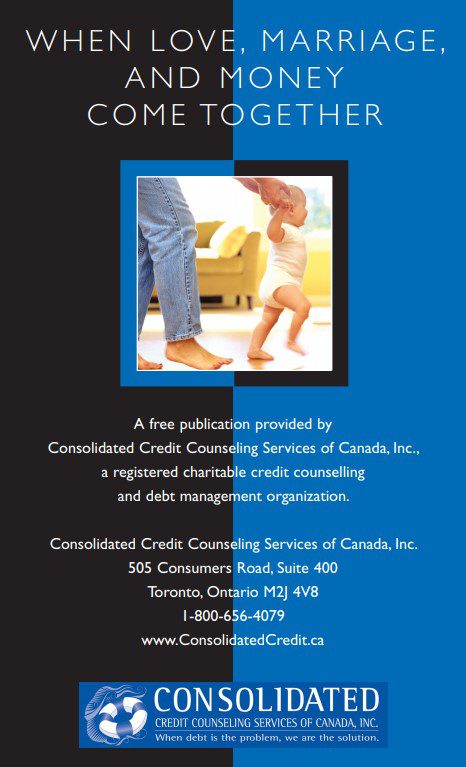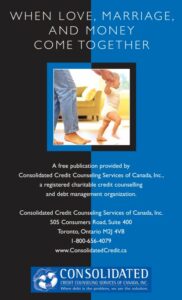
When Love, Marriage, & Money Come Together
You know the old saying: “First comes love, then comes marriage. . .” Unfortunately, however, many newly-married couples start their new lives strapped with debt. Some bring their own debts with them to the marriage; others start racking up credit card bills as they plan their weddings and honeymoons together.
Our Educational Team has created over twenty-five publications to help you improve your personal finances. This is one of them and we want to help you.

Congratulations on taking this important step to a brighter financial future. Consolidated Credit Canada has been helping Canadians across the country solve their credit and debt problems for years.
Our Educational Team has created over twenty-five publications to help you improve your personal finances. By logging onto www.consolidatedcreditcanada.ca you can access all of our publications free of charge. We have tools to help you become debt-free, use your money wisely, plan for the future, and build wealth. The topics Consolidated Credit Canada addresses range from identity theft to building a better credit rating; from how to buy a home to paying for university. On our website, you will also find interactive tools that allow you to calculate your debt and see how much it is costing you.
We are dedicated to personal financial literacy and providing a debt-free life for Canadians. If you are overburdened by high-interest rate credit card debt, then I invite you to speak with one of our trained counsellors free of charge by calling 1-800-656-4079 for free professional advice.
Sincerely,
Jeffrey Schwartz
Executive Director
Consolidated Credit Canada.
When Love, Marriage, & Money Come Together
You know the old saying: “First comes love, then comes marriage . . .” Unfortunately, however, many newly-married couples start their new lives strapped with debt. Some bring their own debts with them to the marriage; others start racking up credit card bills as they plan their weddings and honeymoons together.
Young couples often assume that they can’t have financial problems because they’re pooling their financial resources, including income and debt payments. Wrong!
Just because you’re pooling your resources doesn’t mean that you can pay for your debts any easier than before. Sure, your income may go up when you get married, but so can your debt. When one spouse takes on the debt obligations of the other, credit problems can ensue. In fact, paying for debts incurred by others, usually family members, is one of the most common reasons cited by individuals seeking credit counselling and debt management assistance.
One couple took the plunge and got married right into $56,000 worth of debt. The husband had a rocky credit history, yet was determined to pursue his dream of starting his own company.
Trying to be supportive, his new wife let him charge to the hilt on credit cards held in her name only. The husband’s financial history proved prophetic. His business failed, and unfortunately, their marriage did as well. The wife was stuck with the fallout from his shattered hopes-mountains of expensive debt, all in her name.
Overwhelming debt can be devastating, both financially and personally. But there is help available if only you’ll use it. Credit counselling services will help you create a budget and can work with your creditors to consolidate your bills and arrange more affordable payment plans, often with lower interest.
When you’re young and in love, it’s only natural to want to share everything. But be careful; the ties that bind should be those of mutual love and respect, not mutual debt.
What can you do to avoid added debt if you’re getting married? First, look at your existing monthly financial obligations. If you can’t add another car payment, or you’ve worked hard to keep your credit card expenses to the minimum, just say so. Explain to your beloved that it’s better for both of you to avoid taking on more debt. In the event of a split down the road, even a divorce decree cannot change the fact that your good credit rating is tied forever to any debt you signed or co-signed for.
As new families come together, each person needs to consider his or her values. Money management is an important part of your value system and will often determine whether or not you will achieve your goals. Consider the following:
• How important is money in your life?
• Does money consume all your thoughts?
• Does someone else make financial decisions for you?
• Are you concerned about your debts?
• What effect does money have on your relationships with family members and friends?
In a survey of 49 of Forbes Magazine’s richest people, 37 percent reported lower than average happiness levels, according to an ABCTV special report called “The Mystery of Happiness.” It seems obvious that money does not make people happy, nor does it bring love, power, freedom, self-worth, or security. Money is just that: dollars and cents.
So what can you do to ensure that you are both financially secure and happy? Researchers say that it’s more important to your emotional well-being to be independent, have a purpose in life, and maintain a good sense of humour than to focus on money. Research indicates that married people are less likely to die from strokes, accidents, flu, tuberculosis, and various forms of cancer.
Instead, look at how you perceive money. As you begin your life as a married person, this could be the perfect time to change how you look at money.
Joint Accounts
Most couples open joint accounts when they get married. It’s easy to do, especially if both spouses have accounts at the same bank or credit union.
A joint account is simply a bank account that has two or more people as the holders of the account. One advantage of joint accounts is easy to access funds in the event of the untimely death of one of the spouses. It’s not a bad idea for a couple to maintain one joint chequing account as well as individual personal chequing accounts. Both spouse’s paycheques can be deposited into the joint account, and all bills paid from it. That way, both spouses know where they stand as a couple. Plus, bookkeeping and account costs may be kept to a minimum because of the higher combined balance.
Once you are married, any joint credit accounts-including auto loans, credit cards, and mortgages-will show up on each spouse’s credit reports. The husband’s use of credit impacts his wife’s credit report and vice versa.
Be honest with your spouse; disclose your income, your debts, your assets, and your investments. It’s not a bad idea to exchange credit reports before you marry. In most cases, you will not be held liable for your spouse’s credit card debt, unless you signed onto a joint account.
In general, though, if you keep credit cards and assets separate, the only way a credit card company might claim your assets is if money in your account was deposited there to defraud a creditor.
Also, if one spouse has bad credit, some mortgage lenders prefer that the creditworthy spouse applies for the loan in his or her name only. This can be a problem if you would need both incomes to qualify.
Often, problems ensue when two spouses have different financial expectations going into the marriage. Finances can become especially troublesome in marriages where the spouses already have financial obligations from prior relationships. The situation becomes even more complicated when new spouses are forced to deal with divorce, child support, alimony payments, and child visitation. Problems can arise, for example, if a person who’s paying child support expects a new partner to contribute more for household expenses; that may come as an unpleasant surprise to the new partner.
Divorce terms vary greatly. Each partner’s circumstances should be fully discussed early in the relationship and certainly before any remarriage. Be open regarding the obligations you have with your former spouse-both financial and otherwise.
New spouses are not legally obligated to support stepchildren, but their lives will certainly be affected by their spouse’s ongoing financial commitments to the former family.
Partners can become bitter when their spouses pay large sums of money to their former family while the new household is left with only a fraction of that amount.
It’s important to discuss money matters and obligations openly. You’ll want to know how much support is being paid or received, how long it will last, and what future commitments have been made.
Make a list of financial goals for the new family, and share your ideas on how you will work to achieve them. Parents should talk to a professional regarding updating their wills. You should also check the beneficiaries on your life insurance policies, retirement plans, and RRSPs.
Communication is the best way to resolve conflicts over money with your partner. Both partners need to share power and decision-making, even if one party thinks he or she is better at investing or managing money. An unequal marriage is less likely to succeed. Here are some tips to improve communication about financial matters:
1. Discuss your concerns, but do not confront or criticize your spouse. Remember that you are a team.
2. If you have a concern, be specific about what’s troubling you. Example: “I’m feeling concerned about the amount of money we’re investing in risky stocks.”
3. Try for a win-win resolution of all conflicts. You may find that your needs are different than those of your spouse; that doesn’t mean they’re mutually exclusive.
4. Learn to empathize with your spouse. Experts say this is the key to resolving conflict.
Tips for Blended Families
Do
• Discuss expectations
• Consider a prenuptial agreement
• Treat children equally
• Set financial goals.
Don’t
• Spoil your children
• Compare “my children” and “your children”
• Fail to disclose your financial obligations
10 Steps to Financial Freedom:
1. Determine how much you owe. Gather your credit card statements, and make a list that includes interest rates, balances, and minimum monthly payments. List the cards by the interest rates they charge, with the highest rate first.
2. Keep the card with the lowest interest rate and cut up the others. Close those accounts.
3. If you don’t have a card with an interest rate of less than 14%, get one.
4. Resolve that you will use your cards only for essentials over the next six months. For other purchases, use cash or an Interac card.
5. Credit cards often require minimum payments of about 2.5%. If you just make minimum payments, you will be paying your debts forever. For example, if you owe $1,000 on a card with a 17% interest rate, it might take 12 years and cost over $900 in interest by the time you pay it off.
6. Calculate how much you can pay over the minimum. Try to stretch your budget. If the minimum payments on your credit cards total $350 a month, for example, how much could you pay if you really stretched? $750? No pain, no gain.
7. Apply any additional funds towards the card with the highest interest rate. If two cards have the same rate, apply additional funds toward the card with the largest balance. Pay the minimum on your lowest interest rate credit cards until you’ve paid off the balance on the more expensive cards.
8. Consolidate your debt. Many credit card issuers offer introductory rates as low as 5.9% for six months. If you’re really serious about getting out of debt in a hurry, transfer your largest, high-rate balances to a card with an extremely low rate and pay them down aggressively. Watch out for transfer fees, though. In many cases, the fees will cost you more than you can save.
9. If you are unable to transfer all balances to one low-interest rate card due to your debt-to-income ratio or because you are juggling your card payments, then consider contacting a credit counsellor at 1-800-656-4079. Debt management programs usually can help you organize debts into one low monthly payment, reduce or eliminate interest charges, and help restore credit ratings.
10. Consider using your savings to get out of debt. Sure it sounds harsh, but if you put together a balance sheet, your debt would cancel out your savings anyway. If you have money in the bank, you’re earning about 2% to carry debt at 18% or more.
About Consolidated Credit Canada
Consolidated Credit Canada is a consumer-oriented, non-profit organization. We are an industry leader in providing credit counselling and debt management services. Our mission is to assist individuals and families in ending financial crises and to help them solve money management problems through education, motivation, and professional counselling. Our organization is funded primarily through voluntary contributions from participating creditors. Our programs are designed to save our clients money and liquidate debts at an excellent rate.
We are dedicated to empowering consumers through educational programs that will influence them to refrain from overspending and abusing credit cards, as well as to encourage them to save and invest. Regardless of whether your financial problems are due to the purchase of a new home, the birth of a child, major illness, or any other circumstance, we can help.
* If you are headed for a debt disaster visit www.ConsolidatedCreditCanada.ca or call (844)-402-3073 for free professional advice by a trained counsellor.




